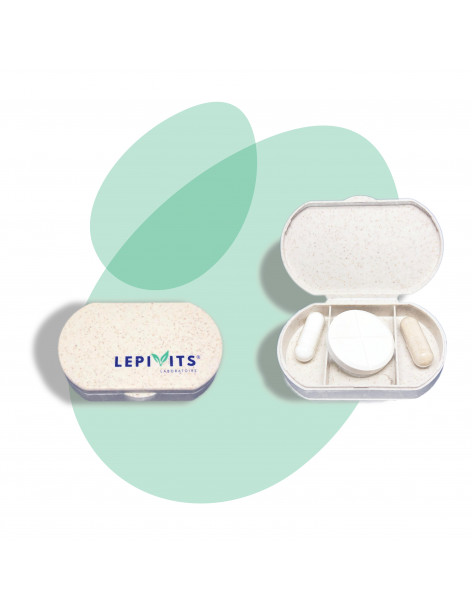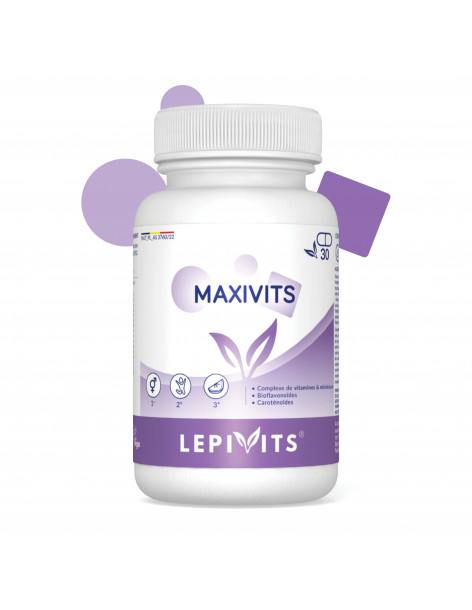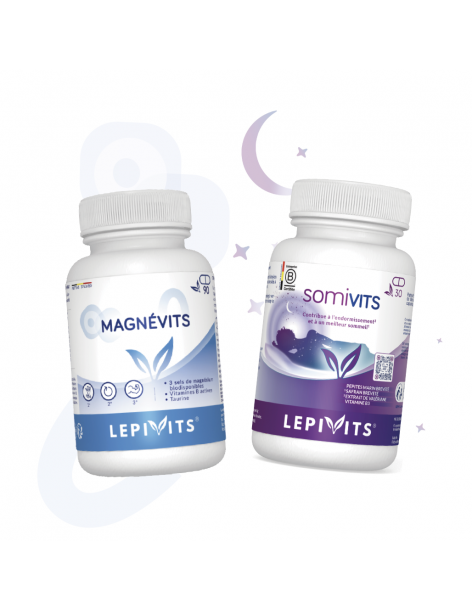Vitamins & Minerals
Why a mix of vitamins and minerals?
Together with trace elements, minerals and vitamins are the vital needs of our body. Our bodies are often unbalanced and require food supplements to make up for any deficiencies. Vitamin and mineral supplements can be used to meet several deficiencies at the same time, thus guaranteeing the supply of essential nutrients.
General food supplements
In France, nutritional deficiencies are very high according to statistical studies, especially in vitamin D (100% of French people are deficient), in magnesium (84%) and there are more than 80% cases of iron deficiency in pregnant women.Read also: Which minerals and vitamins for pregnant women?
The consequences of these deficiencies are felt in the general state of health: fatigue, lack ofmotivation, stress, weakening of the immune system, digestive disorders, etc. What is in our vitamin and mineral formulas?Lepivits' generalist food supplements, such as Maxivits, contain mainly a cocktail of vitamins, but also other nutrients such as minerals and carotenoids. This type of supplementation makes it possible, above all, to provide the dose of nutrients recommended by the French National Health Safety Agency (ANSES) in a single product.
The multivitamin
There are many different types of food supplements for different needs, ranging from sports performance to sleep disorders to work-related stress. It's hard to find your way around when you just want to improve your general health and recharge your batteries before winter. Multivitamins are effective in the long term, to prevent a period of immune weakness, and to avoid overloading ourselves with medication.Multivitamin complexes may contain vitamin C, vitamin E, vitamin A, vitamin B or vitamin K, in different proportions according to the recommended nutritional intake (RNI).
Supplementation for children
Children have an increased need for nutrients to build their skeletons, ensure their growth and form their immune systems. Children's minerals and vitamins help to feed their energy metabolism and compensate for the dietary deficiencies they often experience, especially as they enter adolescence. Far from being a danger if they are well chosen, food supplements for children keep the body in shape, prevent illnesses due to seasonal changes and help the immune system to fight new viruses.
Vitamin requirements
Vitamins are essential to the body. Although they do not provide energy, vitamins are essential for our metabolism, as they facilitate the assimilation of proteins, carbohydrates and minerals. Unfortunately, they cannot be directly synthesised by our bodies, with the exception of vitamin D, which is not produced in sufficient quantities. In order to avoid vitamin deficiencies, we are therefore obliged to provide the required amount of vitamins through our diet or through food supplements.Here you will find a list of vitamins that are essential to our well-being:
- Vitamin A for visual health and skin healing;
- B vitamins for the production of energy, red blood cells and proteins;
- Vitamin C for vitality and natural defences;
- Vitamin D for bone and teeth health;
- Vitamin E, a powerful antioxidant for cell protection;
- vitamin K for blood clotting.
The value of minerals
In our bodies, minerals account for 4% of our total body mass, but are naturally present in very variable quantities: about one kilogram of calcium and another of phosphorus, only a few grams of iron, zinc and fluorine and barely less than one milligram of chromium and cobalt.Although they are involved in a wide range of functions, these minerals each have their own uses and benefits for the body:
- - Iodine: production of thyroid hormone;
- - Iron: manufacture of haemoglobin ;
- - Zinc: ensures healthy skin;
- - Calcium: muscle contraction and bone strengthening;
- - Potassium: muscle contraction and nerve transmission
- - Magnesium: promotes sleep;
- - Chromium: blood sugar control ;
- - Etc.
Whether for specific action or in combination as part of a cure, minerals regulate our metabolism, ensure our biological functions, such as water balance and enzymatic reactions, and contribute to the growth of children.The daily intake of mineral elements therefore varies according to their quantity in the body and their function, one requiring more energy than the other. A balanced and diversified diet is supposed to guarantee these intakes, but losses may occur depending on the cooking of food, as minerals are water soluble. Moreover, in the event of occasional or regular anomalies, these nutritional intakes are not always respected. Mineral supplementation can then compensate for the losses.In summary, why take generalist food supplements?
- - To prevent immune suppression;
- - To compensate for vitamin and mineral deficiencies;
- - To ensure the proper functioning of the body ;
- - To relieve occasional symptoms.





